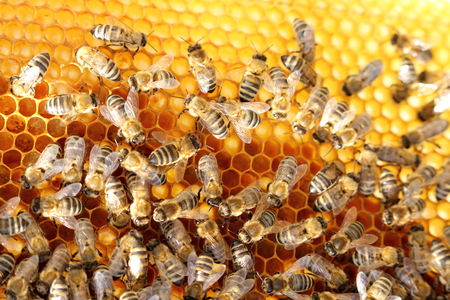Biologists Identify Honey Bee ‘Cleaning’ Genes That Improve Survival
March 07, 2019
It turns out, according to research from York University, that the solution for creating more disease-resistant honey bees may lie in certain groups of genes that control hygienic behavior and enable hives to limit harmful bacteria from spreading as a result. In a hive, some worker honey bees can detect and subsequently remove dead or sick pupae and larvae, and this behavior, which involves genetic components, vastly improves a colony's likelihood of survival. The team behind this most recent finding narrowed down the so-called "cleaning" genes that affect this behavior in order to understand how this unique attribute develops.
The finding, recently published in Genome Biology and Evolution, might lead to new techniques for selective breeding programs throughout the world for enhancing honey bee health. "Social immunity is a really important trait that beekeepers try to select in order to breed healthier colonies," says Professor Amro Zayed, who is a genomics expert with York University’s Department of Biology. "Instead of spending a lot of time in the field measuring the hygienic behavior of colonies, we can now try breeding bees with these genetic mutations that predict hygienic behavior."
According to Zayed, who worked with honey bee biologists from York University, the University of Manitoba, the University of British Columbia, and Agri-Food Canada for this study, "This study opens the door to using genomics to breed healthier and disease-resistant colonies that have higher social immunity. This is of huge importance to the greater community of geneticists who are interested in understanding the genetics of this novel trait."
For this study, the researchers sequenced genomes from three honey bee populations—two were bred with highly hygienic behavior while the third was bred with typical hygienic behavior. Brock Harpur, formerly Zayed's doctoral student but now an assistant entomology professor with Purdue University, examined these different bees’ genomes and searched for regions that differed between the hygienic and unhygienic bees. Harpur identified roughly 73 genes likely to control this highly hygienic behavior.
"Now that we have identified these candidate genes, we can look for the mechanisms of hygienic behavior and begin to develop tools for beekeepers to breed healthier colonies," Harpur said. The researchers plan to direct a marker-assisted bee breeding program specifically for hygienic behavior, in which honey bees will be chosen for breeding solely based on genetic information. "We think there is a lot of potential here of breeding disease-resistant colonies with a simple genetic test," Zayed said.


.jpg)




